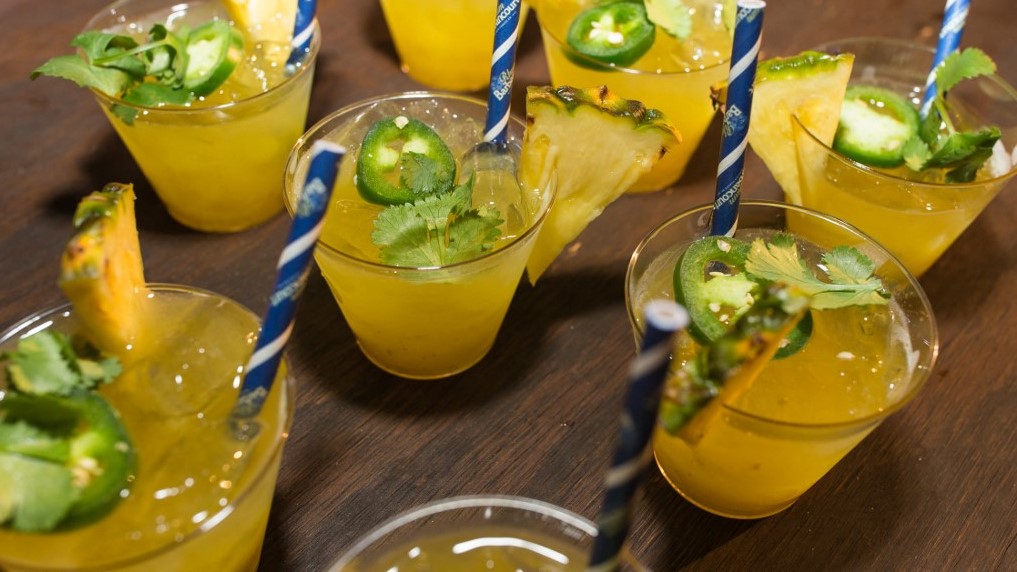The concept was controversial: a pop-up bar offering bellinis and spritzes that, while non-alcoholic, were served in chilled cocktail glasses in the capital of teetotalling Saudi Arabia.
But although customers were initially wary of the experiment -– which coincided with the Muslim holy month of Ramadan, a time of fasting and forbearance -– the bar ended up doing brisk business.
Its success highlights the widening acceptance of more daring non-alcoholic fare even as booze itself remains strictly off-limits in the Gulf kingdom, home to Islam’s holiest sites.
“To be honest, we were skeptical about it, but at the end of the day it worked out,” said Evans Kahindi, brand manager for Blended by Lyre’s, which organized the pop-up.
In Saudi Arabia’s main cities, upscale restaurants are unveiling extensive virgin drink menus and seasoned mixologists are relocating from more freewheeling towns like Dubai and Berlin to pour for deep-pocketed customers, as mocktail mania takes root.
Saudis say the trend is consistent with a broader push by Crown Prince Mohammed bin Salman to transform his oil-dependent nation into a foreigner-friendly business, tourism, and entertainment hub.
Yet the speed of the changes is surprising, said Abdullah Raslan, marketing manager for Blended by Lyre’s, which recently partnered with a food hall in Riyadh’s Kingdom Centre to serve mocktails including a spiced date sour and a “no-groni”.
“I’m not going to lie to you, Saudi is a bit of a religious country, but we’re seeing how it’s becoming more adaptable with what’s happening in the world,” said Raslan, a native of the eastern city of Khobar.
“Have we had a lot of pushback in the past? Yes, we have. Do we still need to educate a lot of people about these drinks?… Yes, we do. But step by step, that’s all we’re asking for.”
Trouble for tipplers
King Abdulaziz enacted Saudi Arabia’s alcohol ban in the early 1950s, not long after an incident in which one of his sons got drunk and, in a rage, shot dead a British diplomat.
Prohibition has been the law of the land ever since, leaving most of the kingdom’s 32 million people with few ways to imbibe.
Foreign missions serve drinks in Riyadh’s Diplomatic Quarter. Some people make homemade wine. Others turn to the black market, where bottles of whiskey can go for hundreds of dollars ahead of holidays like New Year’s Eve.
Beyond that, the only real option is to travel, whether by road to Bahrain or farther afield.
Under Saudi law, penalties for consumption or possession of alcohol can include fines, jail time, public flogging, and deportation for foreigners.
The fast pace of recent social reforms -– including the introduction of cinemas and mixed-gender music festivals –- has fuelled rampant speculation that the alcohol ban might be lifted, or at least weakened with carve-outs in places like NEOM, a planned $500 billion futuristic megacity.
Successful bids to host Expo 2030 and the World Cup in 2034 have further stoked such rumors, though officials publicly maintain any policy change is a non-starter.
‘Saudi champagne’
That is welcome news for Asabek Mashraboy, whose sole experience with alcohol ended poorly: he passed out after one beer.
“I swear to God, from one can of beer, and all my friends were shocked, because I was, like, dead,” said the Uzbekistan native.
That has not stopped the 24-year-old, who later relocated to Saudi Arabia, from becoming bar supervisor at Meraki, a Greek-influenced restaurant in Riyadh’s Al Faisaliah Tower.
Mashraboy gets rave reviews for his non-alcoholic Mykonos mules and old fashioned, even from foreigners accustomed to the boozy versions.
“I can compete with them,” he said confidently when asked how his drinks stack up against those on offer abroad.
It was precisely this challenge that drew marketer Mousa Shihadeh to Saudi Arabia after he completed culinary school in Germany and worked with bars and hotels there.
He acknowledged having some doubts at first.
“In the beginning, it was like, ‘You are a juice manager? What exactly are you doing here?'” he recalled.
Yet he said he has relished the chance to introduce alternatives to time-honored local favorites like “Saudi champagne” -– apple juice and sparkling water –- and syrupy mojitos.
“As I see it, it’s much more complicated to work with non-alcoholic drinks than to work with alcoholic drinks,” Shihadeh said.
“When you come here, you really need to invent the wheel anew.”
